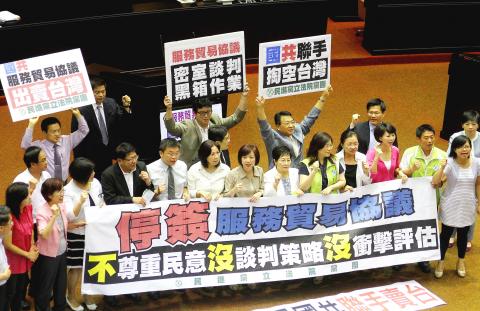|
Lawmakers protest service trade
agreement
By Shih Hsiu-chuan / Staff reporter

Legislators from the Democratic
Progressive Party and the Taiwan Solidarity Union take over the podium in the
legislature yesterday to protest against the signing of the cross-strait service
trade pact between the Straits Exchange Foundation and China’s Association for
Relations Across the Taiwan Straits.
Photo: CNA
Pan-green lawmakers occupied the floor of
the legislative chamber yesterday morning with placards reading “the Chinese
Nationalist Party [KMT] and the Chinese Communist Party [CCP] are hollowing out
Taiwan’s [economy]” to protest the cross-strait service trade agreement that was
signed yesterday afternoon.
As a result of the boycott, the plenary session, which had been scheduled to
review a number of bills, was forced to adjourn until Tuesday.
“We paralyzed the meeting because the cross-strait service trade agreement was a
backroom deal. We must reveal the truth to the public,” Taiwan Solidarity Union
legislative caucus whip Hsu Chung-hsin (許忠信) said.
Hsu said the party demanded that the agreement be sent to the legislature for
approval, not just for the record, and that Premier Jiang Yi-huah (江宜樺) present
the agreement to the legislature to discuss its benefits and drawbacks with
lawmakers.
“The agreement cannot become effective unless the legislature rectifies it,” Hsu
said.
The Mainland Affairs Council had said that it would only submit the agreement on
service trade to the legislature for record after the Executive Yuan approves
it, citing Article 5 of the Act Governing Relations between the People of the
Taiwan Area and the Mainland Area (台灣地區與大陸地區人民關係條例).
Under the article, cross-strait agreements which do not require any amendments
to laws or any new legislation must be submitted to the Executive Yuan for
approval and then to the legislature for record.
Legislator Lo Shu-lei (羅淑蕾) was one of the KMT lawmakers who vowed to rigorously
review the agreement to assess how it would impact the nation’s service sector.
“Which sectors are likely to be harmed? The government should be open to the
public about that,” Lo said.
KMT legislative caucus whip Lai Shyh-bao (賴士葆) said the party would not be
against reviewing the trade pact in the legislature.
“We understand why the public has expressed concerns over the agreement. Their
concerns need to be addressed,” Lai said.
Democratic Progressive Party legislative caucus whip Pan Men-an (潘孟安) said the
agreement would affect the nation in a “destructive” way, with 72 percent of the
nation’s service industry which employs 7 million workers being affected by the
pact.
“It’s not that we oppose trade normalization with China, but Taiwan could lose
its competitive edge as a result of the agreement. There is no shortage of
funds, technology or workforce in service sectors in Taiwan,” Pan said.
Meanwhile, the People First Party (PFP) issued a press release saying that the
legislature was vested with the power to rectify or abrogate the agreement.
The PFP added that it opposed lifting the cap on Chinese investment in sectors
that would devastate local businesses and demanded that the government allocate
sufficient funds to help businesspeople upgrade or transform their businesses
and to assist local businesses in tapping Chinese markets as complementary
measures to reduce negative impacts.
In response to media inquiries, Legislative Speaker Wang Jin-pyng (王金平) said he
had no idea which sectors the trade pact would cover because the Mainland
Affairs Council has never briefed him on the contents either.
|
![]()
![]()
![]()